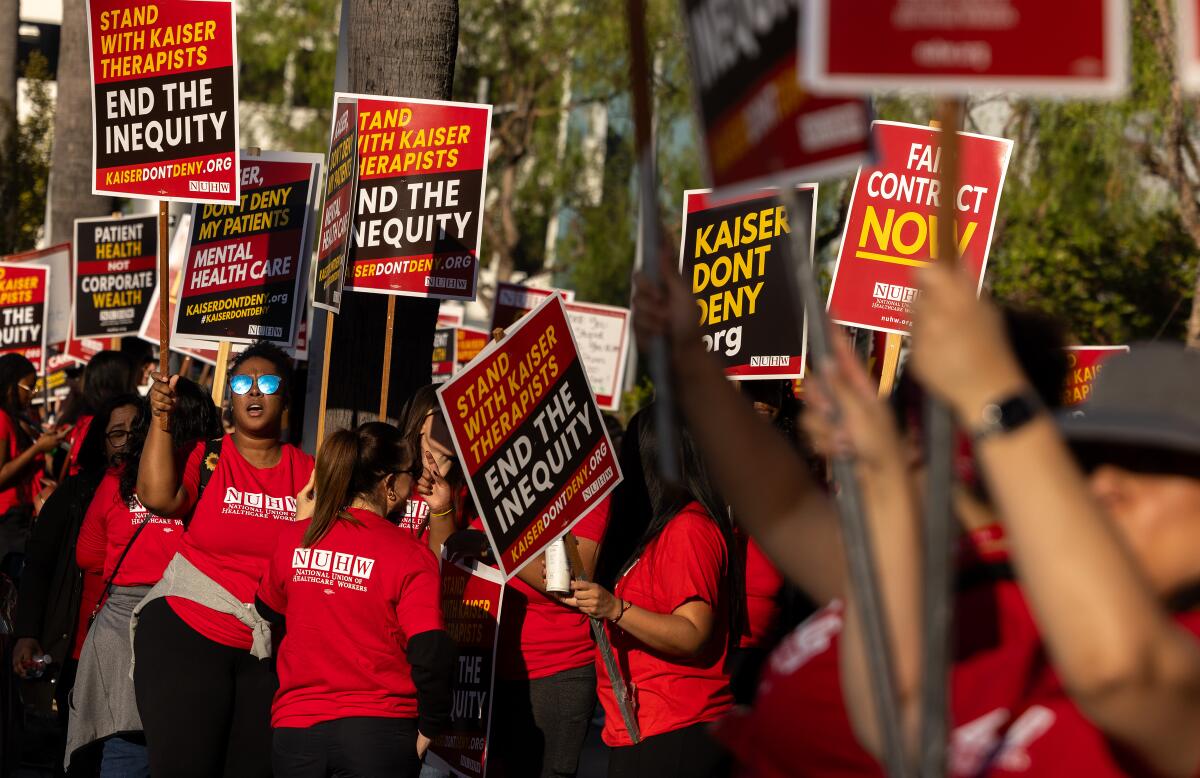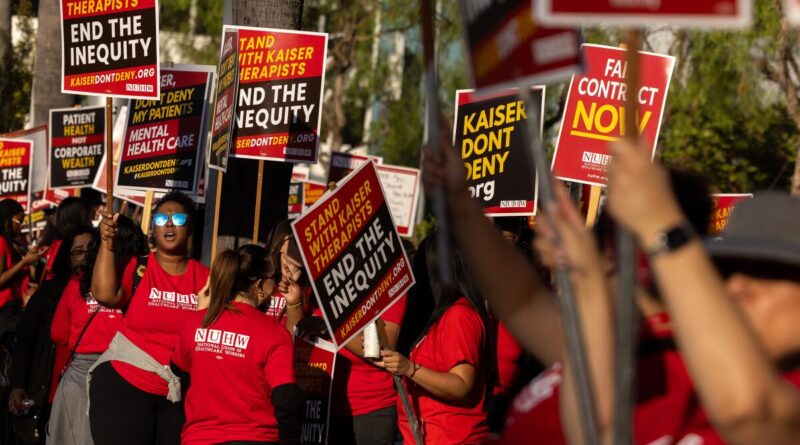Kaiser Southern California mental health professionals go on strike
Psychiatrists, doctors and other mental health professionals working for Kaiser Permanente across Southern California went on strike Monday morning, protesting the health care organization’s failure to address patient care issues. interfere with their mental health care.
The National Union of Healthcare Workers said that about 2,400 mental health workers have started their work after Kaiser managers rejected proposals that the union said would stop the flow of workers and improve care. The NUHW labor contract expired on September 30.
Union members wearing red T-shirts lined Sunset Boulevard outside Kaiser’s Los Angeles Medical Center on Monday morning, brandishing cattle prods and chanting “We’re not going to It takes.”
“Unless we strike, our colleagues will continue to walk,” San Diego psychiatrist Josh Garcia said in a union statement before the walkout, “and our patients will continue to struggle with in the midst of a dysfunctional, dysfunctional system.”
Before the strike, Kaiser said it made strong proposals to improve wages, benefits and training time for doctors. It blamed the union for “slow-moving” negotiations and called its proposals unreasonable, saying any strike was “because the leadership of NUHW chose this path – as opposed to the path of agreement.”
The strike comes a year after Kaiser agreed to a $200-million settlement with California regulators who found that patients were subject to long wait times for treatment appointments. Kaiser agreed to pay a $50 million fine and spend $150 million over five years to improve mental health care.
Kaiser says that even before the government was settled, it had already begun to increase spending on mental health care. The organization said it has spent more than $1 billion to expand its mental health care in recent years and has increased its mental health workforce in California by more than 30%.

Mental health professionals working for Kaiser Permanente throughout Southern California walk through the selection process at Kaiser Permanente Los Angeles.
(Brian van der Brug/Los Angeles Times)
As the health care organization continues to see “all over California, across the state, this mental health crisis, we knew we needed to act quickly,” said Rhonda Chabran, vice president of behavioral health and wellness for Southern California and Hawaii.
Union leaders say the problems continue. In a recent letter to the state, NUHW said Kaiser continues to violate California law, which sets deadlines for providing mental health care, and that “this failure is widespread.” NUHW said in its survey of mental health workers at Kaiser Southern California, 62% of respondents said their departments lacked sufficient staff to provide timely and appropriate care.
Claudia Melo, a child and adolescent case manager in Pasadena who has been prosecuting outside the Los Angeles Medical Center, said her young clients need to be seen in person every week, but “we don’t have the capacity .”
“On Friday I was crying,” said Melo. “It makes you question what you’re doing. … You have to get treatment because sometimes you feel defeated.”
Courtney Isaac, a Bakersfield licensed marriage and family therapist who came to the Sunset Boulevard picket, said Kaiser seems focused on “what can we do to raise the numbers, and what they’re forgetting is that we have very sick patients.”
The pressure is to “book more patients. Schedule every second of every day,” said licensed social worker Leslie Laxson, another Kaiser employee from Bakersfield.
Chabran said in a video statement Monday that Kaiser presented proposals at the negotiating table aimed at ensuring that Kaiser remains a great place to work and is “aligned with our responsibility to provide quality care.” high and low cost for our members.”
The union says it is pushing for higher wages, better benefits and guaranteed turnaround time without patient appointments. NUHW members lamented that unlike in Northern California, where the union said Kaiser doctors are now guaranteed seven hours a week to handle tasks such as preparing treatment plans, Southern California specialists with Kaiser can only get two hours a week to do that.
“There are many things that we have to do when we prepare for the visit: To make appropriate preparations for treatment. Writing letters to our customers. … They don’t give us time to do that,” said Lisa Delgadillo, a Kaiser mental health social worker in Fontana. “People think therapy is just talking to people, but it’s more than that.”
Kassaundra Gutierrez-Thompson, a consultant psychiatrist, says she sees 12 or more patients a day in Kaiser’s virtual therapy program aimed at “mild to moderate” patients. He said that the schedule and other activities leave half an hour for each patient.
Gutierrez-Thompson likened it to being a factory worker. He said: “It’s very difficult to remain a professional in this system. We have to make decisions like, ‘Do I look someone in the eye, or do I finish this letter?’
NUHW has also proposed a series of increases totaling more than 30% over four years. Union leaders say the pay raises are necessary to bring their compensation in line with other Kaiser health professionals.
Kaiser said its Southern California doctors already have more benefits and compensation, with wages above market rates, and that it has offered raises at the bargaining table of more than 18 percent. It also said it provided more time for activities without face-to-face contact, but that the union’s proposal could pull doctors away from seeing patients for a large part of their work week.
NUHW “does not want more time to care for patients. It’s asking more money for doctors to spend less time seeing patients,” Kaiser said in a statement released Monday morning.
The health care system says it has plans in place to mitigate potential disruptions from the walkout, which has no defined length. Because Kaiser relies not only on employees but on an “outside network of contracted providers” for mental health care, an estimated 60% of its patients who receive mental health services and Alcoholism is receiving attention from donors who will not participate in the NUHW strike.
If their regular provider is on strike, Kaiser said, “patients will have the opportunity to be seen by another specialist in our network of highly qualified, licensed specialists.”
Union leaders urged the government to monitor how Kaiser provides care during the strike, pointing out that the Department of Health Care Services found it had canceled appointments for tens of thousands of patients during the strike. walk by doctors in Northern California two years ago.
Shell line workers on Monday slammed Kaiser, saying the organization is “putting bowls in front of patients.”
Linda Cortes, a mental health social worker in Pasadena, said: “I’m going for free.” But I think this is important – to show Kaiser that we are willing to put our money where our mouth is. And they are not.”
#Kaiser #Southern #California #mental #health #professionals #strike
